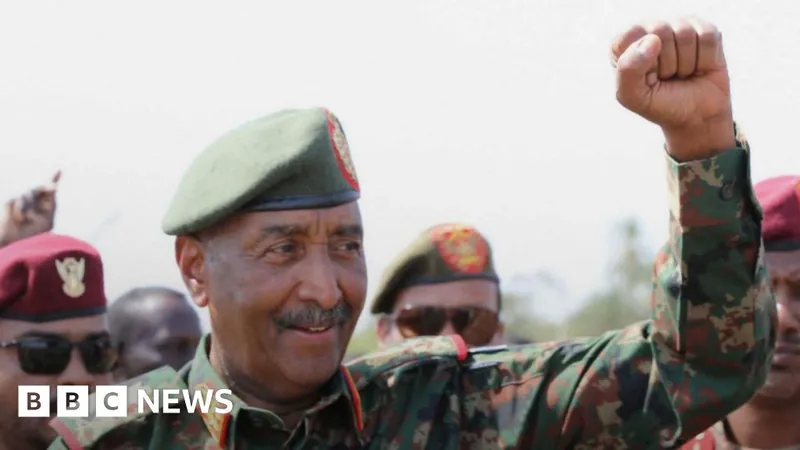
Burhan's Historic Visit to the Recaptured Presidential Palace in Khartoum: Signs of Hope Amidst Ongoing Conflict
2025-03-26
Author: Wai
In a pivotal moment for Sudan, military leader General Abdel Fattah al-Burhan has made a triumphant visit to the presidential palace in Khartoum, shortly after the army regained control of the city from the paramilitary Rapid Support Forces (RSF). Upon landing at Khartoum International Airport, Burhan addressed a jubilant crowd of soldiers, declaring the capital "free" from RSF influence.
"This is the moment we have been waiting for. Khartoum is free, it’s done," Burhan announced, marking his first visit to the presidential palace since the onset of the devastating conflict nearly two years ago.
The military government had previously been forced to relocate to Port Sudan on the Red Sea when the RSF took over the capital in early combat operations. With renewed momentum, the army has swiftly acted to secure not only the presidential palace but also essential state institutions previously under RSF control. An army commander reported that troops had successfully secured the airport and anticipated clearing the remaining RSF fighters from the area by the end of the day.
In a show of strength, the army has reportedly recaptured all critical bridges over the Nile, linking the three cities that comprise Greater Khartoum, along with a military camp in Jebel Awliya, identified as a stronghold of the RSF in southern Khartoum. Residents have seen RSF fighters retreating southwards, towards Jebel Awliya, the final exit route available to them.
Drone footage recently released by the military captured scenes of people crossing a bridge near the Jebel Awliya dam, identified by the military as RSF fighters fleeing Khartoum. Meanwhile, videos shared on social media platforms depict joyous crowds in central Khartoum, celebrating the army's advances following what many describe as a distressing RSF occupation.
Despite the initial victories, the situation remains dire. With reports of mass looting and abuses rampant under RSF control, the conditions in Khartoum have deteriorated severely. Various human rights groups have raised alarms about widespread incidents of sexual violence and other human rights violations during the conflict. Additionally, the UN has warned that parts of the city are edging toward famine due to looting and restricted humanitarian aid from both warring factions.
The air force's recent bombing of a market, which left dozens of civilians dead according to eyewitness accounts, underscores the horrific toll the ongoing conflict is taking on innocent lives.
The recapture of Khartoum represents a significant achievement for the army, providing a potential strategic advantage in this brutal war. However, the conflict is far from over, as the RSF retains control over much of the Darfur region in western Sudan. Both the RSF and the army are receiving backing from foreign powers, which have increased the flow of weapons into the country, complicating international peace efforts that have thus far proven ineffective.
As the situation continues to evolve, the eyes of the world remain on Sudan, where the aspirations for peace and stability are overshadowed by enduring violence and hardship. Will this moment mark a turning tide in the conflict, or are the challenges faced by Sudan just beginning? Time will reveal the outcome as the struggle for sovereignty, peace, and human rights continues.

 Brasil (PT)
Brasil (PT)
 Canada (EN)
Canada (EN)
 Chile (ES)
Chile (ES)
 Česko (CS)
Česko (CS)
 대한민국 (KO)
대한민국 (KO)
 España (ES)
España (ES)
 France (FR)
France (FR)
 Hong Kong (EN)
Hong Kong (EN)
 Italia (IT)
Italia (IT)
 日本 (JA)
日本 (JA)
 Magyarország (HU)
Magyarország (HU)
 Norge (NO)
Norge (NO)
 Polska (PL)
Polska (PL)
 Schweiz (DE)
Schweiz (DE)
 Singapore (EN)
Singapore (EN)
 Sverige (SV)
Sverige (SV)
 Suomi (FI)
Suomi (FI)
 Türkiye (TR)
Türkiye (TR)
 الإمارات العربية المتحدة (AR)
الإمارات العربية المتحدة (AR)